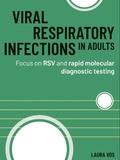Viral Respiratory Infections in Adults
Focus on RSV & Rapid Molecular Diagnostic Testing

Vos, Laura
- Promoter:
- Prof.dr. A.I.M. (Andy) Hoepelman
- Co-promoter:
- Dr. J.J. (Jan Jelrik) Oosterheert & dr. F.E.J. (Frank) Coenjaerts
- Research group:
- Hoepelman , Oosterheert
- Date:
- November 7, 2019
- Time:
- 12:45 h
Summary
Respiratory viruses are associated with a high disease burden among adults. Over the last years, respiratory syncytial virus (RSV) has been increasingly recognized as an important cause of illness in adults. In the first part of this thesis we focus on different aspects of RSV. We first conclude that among adults presenting at the general practitioner with symptoms of a lower respiratory tract infection, viral pathogens as RSV are associated with a disease burden comparable to influenza virus. RSV is detected in 5% of these adult patients, mainly in elderly. We therefore recommend that the current focus on influenza virus should be broadened. Furthermore, we show that the annual RSV epidemic is stable in its length and timing, with an average length of 17-18 weeks, starting in week 46 or 47. Of the RSV-infected adult patients who need hospitalization, 8% dies within 30 days after hospital admission. In these hospitalized patients, we found that subtle changes in the RSV genome might be associated with higher mortality, although our patient numbers were too small to draw any firm conclusions. In the second part of this thesis, we focused on the diagnostic accuracy and impact of molecular rapid testing for respiratory viruses. We showed that most available molecular panels have a high sensitivity and specificity and generate results within a few hours from sampling. Within the viral respiratory season, the implementation of such rapid diagnostic test in a hospital care setting has positive effects on the use of in-hospital respiratory isolation measurements and on the targeted use of oseltamivir. However, it does not result in a lower antibiotic prescription rate.